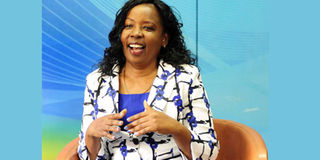Most social ills originate from home

Counselling psychologist Josephine Kinya on September 10, 2018. PHOTO | CHRIS OMOLLO
What you need to know:
- When I talk to parents, I remind them that parenting is a learning process and none of us has a manual on how to go about it.
Most parents come from a point of ignorance or lack of information and it is therefore important that they attend parenting forums to get tips and advice.
For more than 10 years, Mrs Josephine Kinya Abincha has been practicing as a counselling psychologist and an addiction expert.
In a quest to find answers to questions that were bothering her, she found a passion to help other people transform their lives. Early this year, she founded a rehab centre, Living Dreams Poly in Rongai. Besides that, she is a seasoned human resource consultant.
Growing up, were you the child that others came to for problem solving?
Partly yes, but also I was a kid with many unanswered questions. I really wanted to understand why people behave the way they do. When I was enrolled to study a degree in education at the University of Nairobi, I realised that it is not what I really wanted to do and switched faculties to psychology.
I started out as a counselling psychologist but later enrolled for a higher diploma in addiction with Sup-port for Addiction Prevention and Treatment in Africa (SAPTA) after realising that issues such as depression go hand in hand with drug abuse, especially alcohol.
Prior to opening a rehab centre, you had worked as a counselling psychologist for more than 10 years. What stirred you?
Through handling patients, I realised that most deal with issues stemming from their home environment. I thought of starting a home away from their home where they can learn and be guided on how to make better decisions.
Also, in 2016, I lost a brother who had delved into drug abuse and I felt that if I knew what I know to-day, he’d probably be alive. His demise and the need to help prevent other people from what we went through, fostered me to open the centre.
In your clinic, you get to see individuals from all age brackets. What are young people, in particular dealing with?
Their challenges are diverse but mostly it is depression and drug abuse. Others are trying to find closure in pornography and homosexuality. Unfortunately, most of what is ailing the young people stems from their homes and the kind of environment they grew up in. When patients come in, even before I get to know their issues, I create a rapport and understand how best to engage them.
Counselling is an art and more like a relationship. Both the patient and psychologist have to be comfortable with each other before the sessions begin.
In an era that such issues are rife, could you add your thoughts to the possible solutions?
When I talk to parents, I remind them that parenting is a learning process and none of us has a manual on how to go about it.
You realise that most parents come from a point of ignorance or lack of information. I opine that it is therefore important that they attend parenting forums to get tips and advice.
Regrettably, most 21st century parents don’t have the time for such- even when no costs are involved! Same forums and trainings should be extended to young people especially in schools and institutions of higher learning.
What gives you satisfaction as a counselling psychologist and addiction expert?
When I am able to make a positive impact to the people I interact with. Seeing my clients change for the better, be able to cope with life and improve their self-esteem gives me contentment.
My greatest wish is to be able to offer counselling services at no cost because there are several people out there who need professional counselling but cannot afford to pay, albeit the charges are friendly.
What is the biggest revelation you’ve learnt through what you do?
As human beings, we have the power. We have the potential but we don’t know it.
That’s profound!
In my course of work, I have heard individuals lament how some things are undoable but once they try, they realise that it only needed a shift of perspective and putting in some effort.
What was your biggest worry in your early twenties? Does it still worry you?
I got married and had a child while still in my early twenties. My love for family gave me a bundle of nerves sometimes. Will I make a good wife? Will my marriage last? Will I be a good mother and role model to my kids? Is it still a worry today? Absolutely not.
All I have now is hope that my clients and children will lead a better life. However, there are occasional times that I get concerned about some of my clients because as a therapist, there is just much that you can do and the rest you leave it up to the patient. However, even when the journey to recovery is difficult, I keep praying that we get there.
Do you have a mantra that you live by?
Psalms 23.
Do you have practices that help you recharge?
I walk and sometimes drive without a definite destination. I am an introvert so I mostly reenergise my-self from the inside… I also listen to soft music and pray.
If you were to take back to your early twenties, what would you tell your younger self?
I would lavish her with encouragement that what she sets herself on can be done. I would also tell her to have the serenity to let go of things that cannot be changed.





